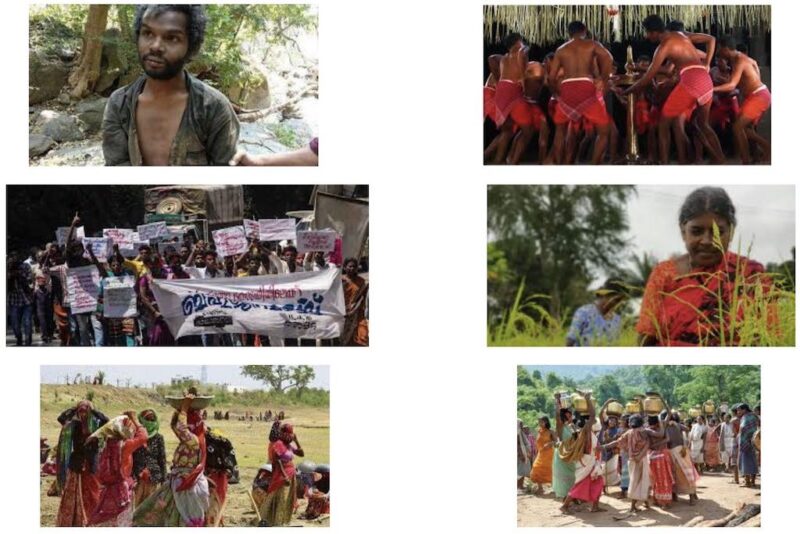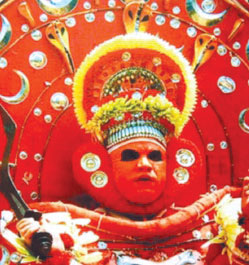“The Folklore Akademy, recently in its study and analysis have identified various other folklore art forms which are a part of our rich cultural heritage. ‘Brahmini pattu’, ‘Chaatt Pattu’, ‘Chakra Pattu’, ‘Kadal vanchi Pattu’ and the tribal songs are the recent additions to the folklore art. There are different types of tribal and traditional songs.
The tribal songs of each ‘Ooru’ (a tribal colony) are different,” he said. […]
According to Pradeep Kumar, as per their assessment, there are nearly 1,000 folk art forms existing in Kerala, which have been passed on from generation to generation.
Source: Folk Art Forms from Far and Wide to Converge in City
URL: http://www.newindianexpress.com/cities/kochi/2014/jan/22/Folk-Art-Forms-from-Far-and-Wide-to-Converge-in-City-566887.html
Date visited: 11 August 2019
KANNUR: Nowadays, it’s rare to hear folk songs being sung by contestants belonging to the tribal communities. So, when a group of tribal girl students rendered the folk song ‘panthal patt’ at the state school youth festival on Sunday, not only was the audience enthralled, but a record was also created as the team from Government High School at Balal in Kasargod won an ‘A’ grade, a first for tribal students. |
Source: Sahla Nechiyil, Express News Service, 23rd January 2017
URL: http://www.newindianexpress.com/states/kerala/2017/jan/23/little-bards-croon-the-folklore-of-their-tribe-at-kerala-school-youth-festival-1562448.html
Date visited: 11 August 2019
Kerala Folklore Akademi, an independent center for cultural affairs, was established on 28 june 1995. The main objective of the akademi is to promote and project the traditional art forms of Kerala.
Kerala Folklore Akademi, an autonomours center for cultural affairs, is located in Kannur. Kannur District, Kerala.The institution was constituted by the Goverment of Kerala and works under the Cultural Affairs Department, Goverment of Kerala.
The institution provides financial assistance of folk artists.Economic aid programs and academic councils are conducted to promotr the traditional Kerala art forms. The institution aims to promote and preserve the traditional art forms of Kerala. Kerala Folklore Akademi was constituted by the Goverment of Kerala on 28 June 1995 under the Cultural Affairs Department,Goverment of Kerala, Trivandrum. The Institution was formed under the Travancore Cochin Literary, Scientific and Charitable Societies Registration act of 1955. It began functioning on 20 January 1996.
Ongoing projects.
Awards, Felloships and Gurupooja Puraskar to the established artists.Last year the distribution was as follows:Felloship – 3, Awards – 27, Gurupooja Puraskar – 22 A part from this, talented young artists are awarded Prasasthi Pathram also. On the name of our former Chairman late P.KKalan an award is constituted worth Rs.50000/- This year the award was given to the top most folk performing artists/researcher for their total contribution in the field of Folkelore.
Source: Kerala Folklore Akademi
Address : http://keralafolkloreakademy.com/about_us.html
Date Visited: Tue Oct 07 2014 13:20:31 GMT+0200 (CEST)
The Hindu, KANNUR, August 22, 2011
Mohamed Nazeer
The Kerala State Folklore Akademi is planning to develop four ‘folk villages’ for preserving and displaying the unique features of rural life and culture.
The folk villages will be ‘living museums’ displaying features of indigenous rural culture, including the rich folk tradition and folk arts, the akademi’s new chairman, B. Muhammad Ahamed, told The Hindu here on Sunday. He said the folk villages would be modelled on similar projects in different parts of the world that showcased replicas of traditional cultural elements, practices, performances, skills, and craft. […]
Performance of folk arts and the ritual of Theyyam would be the major features of the folk village planned at Kannapuram, he said. A third folk village would be developed in a village in Malappuram, while the proposal to develop the fourth one in an Adivasi area to showcase Adivasi life and culture was under serious consideration. Talking about expanding the activities of the akademi, Prof. Ahamed, who had served as chairman of the akademi earlier also, said the institution was now planning to extend its activities to the southern parts of the State to popularise folk culture and create awareness among people in those areas. […]
A folklore centre was proposed in Chembai village in Palakkad district as part of this initiative […]. A similar centre was also proposed in Thiruvananthapuram district, he said. Prof. Ahamed said the akademi, established in 1995 with the objective of promoting and projecting the traditional art forms of the State, would also extend its efforts to identify folk artistes in financial difficulties and ill-health and offer them financial grant.
The development activities taken up on the premises of the akademi — located on the banks of a ‘chira’ (pond) at Chirakkal, the seat of the erstwhile Kolathiri Rajas — would also be completed, he said. A Cherusseri auditorium, which would have a statue of Cherusseri, was nearing completion and its inauguration was being planned as the first programme of the new board of the akademi. […]
The archives would house folklore items, including records and documents, from different parts of the State. The archives would be planned in a separate building on the same premises.
Folklore akademi plans ‘folk villages’ to revive public interest in the unique features of rural life.
Source: The Hindu : NATIONAL / KERALA : Space to preserve folk traditions
Address : http://www.thehindu.com/todays-paper/tp-national/tp-kerala/article2381105.ece
Date Visited: Fri Sep 02 2011 21:49:49 GMT+0200 (CEST)
[Bold typeface added above for emphasis]
Up-to-date reports by Indian journalists and commentators
To search Indian periodicals, magazines, web portals and other sources safely, click here. To find an Indian PhD thesis on a particular tribal community, region and related issues, click here >>
Search tips
Combine the name of any particular state, language or region with that of any tribal (Adivasi) community.
Add keywords of special interest (music, poetry, dance just as health, sacred grove and biodiversity); learn about the rights of Scheduled Tribes such as the “Forest Rights Act” (FRA); and the United Nations “Declaration on the Rights of Indigenous Peoples”, “Universal Declaration of Human Rights”, “women’s rights”, or “children’s right to education”.
Specify any other issue or news item you want to learn more about (biodiversity, bonded labour and human trafficking, climate change, ecology, economic development, ethnobotany, ethnomedicine, global warming, hunter-gatherers in a particular region or state, prevention of rural poverty, water access).
For official figures include “scheduled tribe ST” along with a union state or region: e.g. “Chhattisgarh ST community”, “Himalayan tribe”, “Scheduled tribe Tamil Nadu census”, “ST Kerala census”, “Particularly Vulnerable Tribal Group Jharkhand”, “PVTG Rajasthan”, “Adivasi ST Kerala”, “Adibasi ST West Bengal” etc.
In case the Google Custom Search window is not displayed here try the following: (1) toggle between “Reader” and regular viewing; (2) in your browser’s Security settings select “Enable JavaScript” | More tips >>
Note: hyperlinks and quotes are meant for fact-checking and information purposes only | Disclaimer >>
See also
Biodiversity and development – Kerala
Childhood – Kerala | Childrens rights: UNICEF India | Safe search
Childrens rights: English or Malayalam (UNICEF India)
eBook | Background guide for education
Education and literacy | Right to education
Kerala | State wise ST list (Scheduled Tribes)
Recommendations by the Expert Committee on Tribal Health
Tribal schools and educational projects – Kerala
Video | M.S. Swaminathan on Biodiversity and the sharing of resources
Video | Trailer to “Have you seen the arana?” – Kerala
Vulnerable tribal groups – Kerala
Women | Safe search | President Droupadi Murmu on women’s empowerment

Tips for using interactive maps
Toggle to normal view (from reader view) should the interactive map not be displayed by your tablet, smartphone or pc browser
For details and hyperlinks click on the rectangular button (left on the map’s header)
Scroll and click on one of the markers for information of special interest
Explore India’s tribal cultural heritage with the help of another interactive map >>
